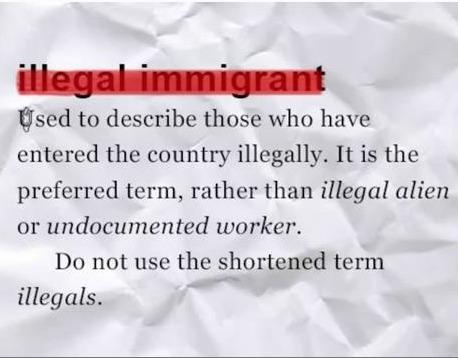BOB GARFIELD: More on the power of words. On Tuesday, the Associated Press omitted the phrase “illegal immigrant” from its stylebook. The AP now directs journalists to use the word “illegal” only to describe the residency status of a person, not the person himself or herself. A semantic nicety? Not according to José Antonio Vargas, the former Washington Post reporter who now runs the “Define American” project, which has been campaigning for this change for months. Last fall we spoke to him and he made his case.
JOSE ANTONIO VARGAS: Actions are illegal, not people. Can you imagine like hearing this word “illegal” [LAUGHS] and knowing that it refers to you, what that does to somebody?
BOB GARFIELD: This week we spoke with AP editor Tom Kent, who explained that the change is part of a larger decision to try to eliminate labels from the style guide.
TOM KENT: It’s not just about “illegal” in “illegal immigrant.” We like to put the focus on action, what people are doing or the condition they find themselves. The AP used to say, “the wheelchair-bound attorney.” Now we say “the attorney who uses a wheelchair.” We used to say “a schizophrenic.” Now we say, “Smith, who has been diagnosed with schizophrenia.” It's the same thing with illegal immigrant. So we say “Smith, who is in the country illegally.” We’re still maintaining the concept of illegality but were just using the word in, we think, a more appropriate place rather than as a label at the - ahead of the name.
BOB GARFIELD: When I talked to Jose Antonio Vargas last fall, he proposed an alternate way to frame the issue and he said, simply, to replace the word “illegal” with “undocumented.” But that’s a no-go as well with the AP. Why?
TOM KENT: We talked about “undocumented” but to us it's vague. What does it mean? A lot of people who find themselves in this situation have plenty of documents. They have birth certificates. They may have passports from their home countries, depending on the state. They may have a valid US driver’s license. The problem isn’t that there's no documents in their pockets. The problem is that they do not have a legal right to be in the United States.
BOB GARFIELD: But what about talking about the entire population of those in the country illegally, do the same rules apply?
TOM KENT: Our style is not to use “illegal immigrant” singular or plural. It’s not just about whether we’re talking about one person or a group. So we would talk about people in the country illegally.
BOB GARFIELD: Now, it makes writing a little more cumbersome to phrase things the way you now phrase them. If the underlying condition is well understood, why is it more stigmatizing to be called an “illegal immigrant” than to be called “an immigrant who is in the country illegally?”
TOM KENT: Well, this isn’t about stigmatization and it isn't about politics, on one side of the issue or the other. It’s just an approach that we use to describe people in general, and it's been spreading through our stylebook, and we've come to the point where we want to apply it to the “illegal immigration” entry as well.
You said that our approach now makes it more difficult to write. We’re not sure that’s true. We think that it's a little scarier perhaps in the anticipation. We've taken some AP stories and headlines and rewritten them pretty successfully. For example, we had in one story a reference to a pathway to citizenship for the millions of illegal immigrants already here and changed that to a pathway to citizenship for the millions of immigrants living illegally in the United States. We’ve done the same thing with headlines. Within our 50-character short headline count, instead of saying “Cheaper College for Illegal Immigrants in Minnesota,” we can write “Cheaper Minnesota Tuition for People Illegally in the US.” It’s still 50 characters.
BOB GARFIELD: What about the term “illegal immigration” itself, is that still kosher?
TOM KENT: Yes, we still use that term. It’s still a fact that illegal immigration exists. That term is still available for use anywhere in the world where it applies.
BOB GARFIELD: Now, it happens that the AP Stylebook doesn't necessarily govern only Associated Press journalists. It's used as the standard for much of American journalism. Do you keep in mind the fact that you’re creating standards that will apply across the board?
TOM KENT: We’re happy that people throughout journalism, in the United States and elsewhere use it as a standard reference, but there's nothing that forces any news organization to use everything in the Stylebook. They’re grown up enough to have their own style or their own exceptions.
BOB GARFIELD: Tom, I know you said this is an utterly apolitical decision, but the Republican Party has explicitly embraced “illegal.” Politicians are encouraged to use it because they know it has emotional clout. Whether you want to be political or not, this is ultimately a political decision, no?
TOM KENT: We don’t consider it a political decision. And people have asked us what about the timing of this? You’re doing this right at the start of a major immigration debate in Congress. I will admit to you that there is a timing issue here. This is the deadline for the new print edition of the AP Stylebook, and that's the timing that we had in mind.
BOB GARFIELD: Tom, thank you very much.
TOM KENT: Thank you, Bob.
BOB GARFIELD: Tom Kent is deputy managing editor and standards editor for the Associated Press.
